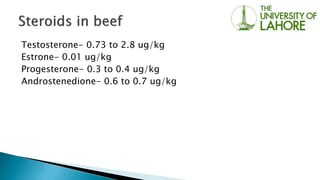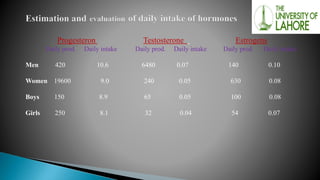steroids presentation.pptx
- 2. Presented by M usman Ahmad Naeem Khurram Iqbal Presented to Dr. Areeba Steroids
- 3. What are steroids? • They are defined as any of a large class of non polar organic compounds with a characteristic molecular structure containing four rings of carbon atoms (three six- membered and one five). • They are synthesized in glands and delivered by the blood stream to target tissues to stimulate or inhibit some processes. • Steroids have two principal biological functions which are : i. Activating the steroid hormone receptors ii. Altering membrane fluidity in cells
- 4. Steroid core structure The core structure consists of 17 carbon atoms bonded in combined rings containing 4 rings which are 3 cyclohexane and one cyclopentane rings. The steroids then differ from each other by the functional groups that are attached at the four rings. Basic steroid structure
- 5. Types of steroids • Sex steroids - influence sexual differences and reproduction e.g progesterone, testosterone, estrogens • Anabolic steroids - increase muscle and bone synthesis • Corticosteroids - anti inflammatory
- 6. Synthesis of Steroids • Steroids can either be synthesized chemically or biologically • Synthesis of all hormones in the body start with the conversion of cholesterol to pregnenolone by an enzyme called CYP11A which can then be converted to other hormones. • The natural steroid hormones are generally synthesized from cholesterol in the gonads and adrenal glands in the form of lipids.
- 7. Chemical synthesis of steroids • Bechmann’s Synthesis (1940) of Equilenin • Woodward’s synthesis of Cholesterol • Synthesis of Estrone by Torgov (1950, 63), Hughes (1960) • Synthesis of Cortisone by Sarrett (1952), Y. Horiguchi (1986))
- 8. Metabolism and Excretion • Steroids are oxidized by enzymes called cytochrome oxidase enzymes(e.g CYP3A4 introducing oxygen into the steroid rings breaking them down to smaller molecules for example when cholesterol is broken down by enzyme to bile acids. •These as can then be eliminated by secretion from the liver in bile.
- 9. oThe natural occurrence of the sex steroid hormones progesterone, testosterone, 17B-estradiol and estrone in food was investigated. The main metabolic precursors, intermediates and metabolites (pregnenolone, androstenedione, hydroxyprogesterone, dehydroepiandrosterone (DHEA), dihydrotestosterone, androsterone, 17~estradiol and estriol) were also included in the investigation. Particular attention was paid to DHEA, which is said to have anti-aging properties.
- 10. A number of studies have identified steroids in dairy products including estrogens- about 0.16 pg litre- progesterone- 1.4 ug/litre-’ in skim milk to about 10 ug/litre-’ in whole milk and in dried skim milk: 17 ug/kg-‘, dried whole milk: 98/ug kg-‘.
- 11. Testosterone- 0.73 to 2.8 ug/kg Estrone- 0.01 ug/kg Progesterone- 0.3 to 0.4 ug/kg Androstenedione- 0.6 to 0.7 ug/kg
- 12. o Progesterone - 0.24 o Testosterone - < 0.02 o Estrone - < 0.02 o Pregnenolone - 0.59 o Estradiol -< 0.03
- 13. o Progesterone – 25.9 o Testosterone - 0.49 o Androstenedione -9.27 o Pregnenolone – 85.3
- 14. plants can possess hormonal activity which gives rise to visible effects on grazing animals. An influence of steroidal hormones on growth, sex expression and development of plants has also been observed.
- 15. Pregnenolone Androstenedione Progesterone Testosterone Estrone Potatoes 1.3 0.05 5.07 <0.02 <0.02 Wheat 2.5 0.48 2.86 0.09 <0.05 Rice 2.35 ? 0.38 ? <0.05 Mushrooms <0.1 <0.02 <0.02 <0.02 <0.02
- 16. Progesteron Testosterone Estrogens Daily prod. Daily intake Daily prod. Daily intake Daily prod. Daily intake Men 420 10.6 6480 0.07 140 0.10 Women 19600 9.0 240 0.05 630 0.08 Boys 150 8.9 65 0.05 100 0.08 Girls 250 8.1 32 0.04 54 0.07
- 17. Some steroids can be incredibly harmful to those who take them. Conversely, some types of steroids are used to help people with inflammatory conditions like chronic bronchitis, but these are categorized as corticosteroids. They are not the same as the more harmful version: anabolic steroids. Anabolic steroids—sometimes referred to as “juice” or “roids”—are actually synthetic forms of the male hormone testosterone. It may be used legitimately to induce puberty or to help those suffering from wasting diseases like AIDS or cancers. Technically, this group of substances is called anabolic- androgenic steroids (AAS). Common users of anabolic steroids include: Bodybuilders looking to gain muscle. Athletes hoping to improve their skills. People trying to expedite recovery from injuries.
- 18. Since anabolic steroids are synthetic forms of testosterone, they will influence many of the characteristics of gender in the person abusing the substances. In those taking doses up to 100 times the medically appropriate levels, many side effects caused by steroids will occur. Side effects of steroids include: Shrinking of the testicles. Excessive hair growth in women. Deepening of the voice in women. Growth of breast tissue in men. Fertility issues.
- 19. Heart problems Elevated blood pressure. Rapid mood swings. Mania. Stroke. Menstrual irregularities for women.
- 20. Steroid use may lead to dependency. Dependency on the drugs is illustrated in the user by a feeling that they cannot function normally without steroids in their system. Overuse leads to an increase of hormones in the body and can cause more severe side effects than those elicited at lower doses.




















